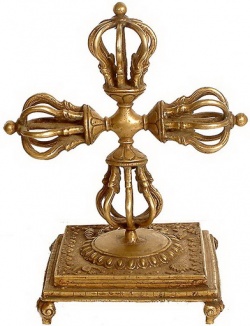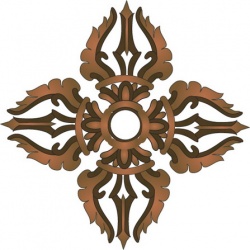Difference between revisions of "Visvavajra"
(Created page with "thumb|250px| Before time began, there was only darkness and the emptiness that is the Void. A gentle wind arose from the four directio...") |
|||
| Line 1: | Line 1: | ||
| − | [[File:Visg2.jpg|thumb|250px|]] | + | [[File:Visv_k93.jpg|thumb|250px|left]] [[File:Visg2.jpg|thumb|250px|]] |
Before [[time]] began, there was only darkness and the [[emptiness]] that is the [[Void]]. A gentle [[wind]] arose from the four [[directions]] that, over [[time]], filled the [[Void]]. It began to grow in power until, after eons had passed, the [[wind]] coalesced into a [[substance]] so thick, so heavy, so solid, so immutable that it formed [[Dorje Gyatram]], the [[vajra cross]] that is the basis of the [[physical]] [[universe]]. | Before [[time]] began, there was only darkness and the [[emptiness]] that is the [[Void]]. A gentle [[wind]] arose from the four [[directions]] that, over [[time]], filled the [[Void]]. It began to grow in power until, after eons had passed, the [[wind]] coalesced into a [[substance]] so thick, so heavy, so solid, so immutable that it formed [[Dorje Gyatram]], the [[vajra cross]] that is the basis of the [[physical]] [[universe]]. | ||
Revision as of 10:15, 5 December 2013
Before time began, there was only darkness and the emptiness that is the Void. A gentle wind arose from the four directions that, over time, filled the Void. It began to grow in power until, after eons had passed, the wind coalesced into a substance so thick, so heavy, so solid, so immutable that it formed Dorje Gyatram, the vajra cross that is the basis of the physical universe.
Also known as the double dorje (visvavajra) this powerful symbol is also associated with Amogasiddhi (Tibetan: Donyo drupa), who is the Karma family buddha. His name means Unfailing Accomplishment. His activity transmutes the klesha (stain, or imperfection) of jealousy. His activity is the subtle one of diminishing attachment. He is green in color, his left hand rests in his lap in the mudra of equanimity and his right at chest level palm outwards in the "granting protection" or "not to fear" gesture. His consort is Damtsig Dolma, Green Tara.
The vajra cross, whether vertical or in X-form, is also considered an emblem of protection.
The vishvavajra, (vishwa or vishva is Sanskrit for world with the connotation of "theuniverse as we experience it," and it means the double dorje or crossed dorjes. It stands for the stability or foundation of the physical world. This is a mark often used as a seal or stamp and may be found impressed or incised on the plate at the base of a statue that protects and keeps prayers/relics inside. It is also the emblem of Buddhist deities whose influence encourages immoveable determination.

